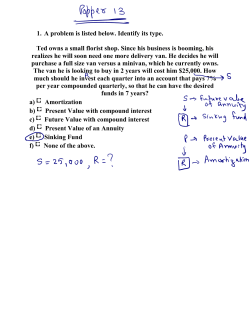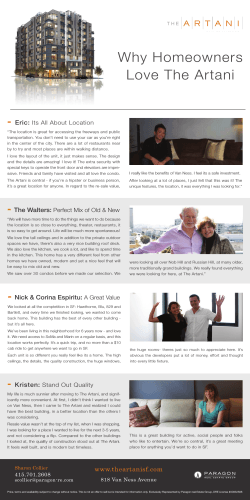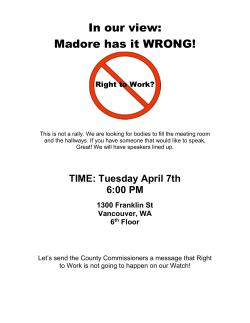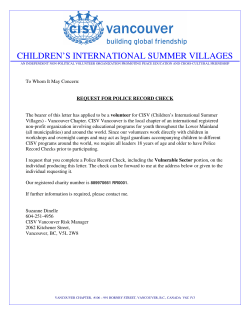
Discover Urban Resources Bios presenters
Bio’s Presenters Discover Urban Resources Dirk van der Ven Dirk van der Ven graduated MBA from TSM Business School in 1997 where he studied management of innovation and technology. After TSM he graduated MSC courses at Georgia Tech (Atlanta) in the field of strategic tech marketing. In 2003 Van der Ven founded a company specialized in innovative and sustainable building infrastructures where he is the CEO to this day. Following the principles of Customer Development and lean start‐up innovation this company is developing and producing on average 50 to 60 new innovative products every year. From an intrinsic value that we have to take responsibility for the impact of today’s decisions on future generations, Van der Ven has become quit passionate, if not fanatical about sustainability. Van der Ven is known in the Netherlands as leading in the field of sustainable innovations. HG van Straaten Since 1991 Gerben van Straaten works at urban development. After Lawschool and School of Economics at the University he started in urban development and community development. He has always aimed to create vital and lively areas, focusing on the complex of activities, more so than primarily on the real estate development. Gerben van Straaten leads a team of about 60 people, all involved in consulting, conceptual design, sustainability and innovations, but surely also the operational management of urban transformations. Gerben van Straaten leads Walas both in Europe as in Canada. He is committed to continuously create new innovations for urban development on both continents and he divides his time evenly. He is known for his business re‐ engineering in the field of real estate and his financial solutions. Paul Beckers Paul Beckers got involved in Walas´ urban farming activities in 2013. He was triggered by the challenge to implement (inter)national policy ecommendations about sustainable food production in an urban setting. Previously, while working for the European Science Foundation (ESF) he was in charge of the dissemination of the foresight study `European Food Systems in a Changing World´. Paul was project manager serving in the Corporate Science Strategy Development unit and the Life, Earth and Environmental Sciences unit at ESF. Prior to his position at ESF, he was Senior Science Officer at the Coordination Office of the European Research Area‐Network Plant Genomics. He is currently as self‐employed consultant involved in the sequel of this programme: ERA‐CAPS. Paul holds a Master’s degree in Biology and he started his career as molecular biologist at the Netherlands Organisation for Applied Scientific Research (TNO), where he conducted research on fungi species for industrial purposes. Irina Molohovsky Social entrepreneur, SFU Radius Fellow and founder of Frameworq, Irina Molohovsky moved to Canada in 2010 after making a life changing decision not to pursue her career as a lawyer. She started working in a local Vancouver company gaining a multi‐disciplinary and international experience in retail and wholesale. But something was still missing. In 2014, Irina started a Social Entrepreneurship program with Groundswell Grassroots Economic Alternatives, realizing that the real passion that drives her is the appreciation to beauty, creativity and innovation and how it all can be translated into a retail model where consumers, designers and retailers are working in collaboration to create a sustainable Circular Economy model. Frameworq is a design lab, practicing the principles of Circular Economy through a series of Upcycling workshops and a developing store and a studio for upcycled, re‐used and re‐purposed clothing and accessories. 1 Theunis Snyman & Jesi Carson Basic Design is a social enterprise based in beautiful Vancouver, BC. We are actively redefining the value of waste by giving a second life to landfill‐bound materials and creating unique, cruelty‐free products. We also work collaboratively with clients on a variety of interior, furniture and communication design projects, striving to use upcycled, local and sustainable materials whenever possible. Co‐Founder & Principal Industrial Designer, Basic Design Theunis is an urban miner and aspiring social entrepreneur working his way to not working at all, but doing what he loves. Through his work at Basic Design, Theunis strives to be creative and socially conscious while practicing good design and having fun. Co‐Founder & Principal Communication Designer, Basic Design Jesi is inspired by compelling stories, engaging spaces and discovering cultures through travel. As Co‐Founder of Basic Design, a social enterprise with a passion for up‐cycling, and Cultivate Projects, a non‐profit focused on building collaborative food gardens, Jesi strongly believes in the power of design as a tool for activism. Paul Oostelbos After his graduation in 1988 Paul has been involved in waste, (waste)water treatment and recycling. He worked at Waterleiding Friesland (production drinking water from groundwater) as process engineer responsible for the establishment of an engineering department, the design and engineering of new plants as well as optimization and trouble shooting and the treatment and recycling of the process wastes. Paul Oostelbos is currently the Director, International Business Development of Orgaworld and as such responsible for the international expansion of Orgaworld. He is responsible for all aspects of growth and development of the company into new markets, especially Canada, as seen with the development of the London and Ottawa facilities. He brings his depth of experience expertise in recycling and waste management to every project that is pursued and executed by Orgaworld. Jan Douwe Kroeske Jan Douwe Kroeske started as a physical education teacher and guide. In 1985, he began his journalism career at Radio 3. As a presenter, he has worked for the public and commercial TV and radio broadcasting programs, such as Radio Tour de France, 12 Cities ‐ 13 accidents, Jules Unlimited and TV‐show 2 Meter Sessions. Jan Douwe Kroeske currently is director of Double 2 BV, a production company for television and events (including Llowlab and Labbsessies). He has a broad interest: curiosity about the world of music, science, technology and sports. Jan Douwe also knows how to make the link between who he is and who he was, namely teacher. He allows himself to be captivated by musicians and technicians. He is the initiator of the multimedia sustainability platform and travelling festival pavilion SummerLabb. SummerLabb allows festival and event visitors to feel, taste and smell (technological) innovations in the field of sustainability. 2 Rob Constanzo Rob Costanzo is the City of Surrey's Engineering Operations Manager responsible for the maintenance of the City's roads, utilities and fleet services as well as the City’s waste management services, including waste collection, planning and policy development, marketing and public education. In addition, Rob leads Surrey's sustainability goals related to waste diversion and reduced carbon emissions from its fleet operations. He is presently overseeing the development of Surrey's Organic Waste Biofuel Facility which will process kitchen and yard waste collected at curbside into a renewable natural gas that will be used to fuel the City’s Compressed Natural Gas waste collection fleet, resulting in a closed‐ loop, net‐zero carbon impact system. Martin Kerner Dr Martin Kerner graduated in biology and hydrobiology at the University of Hamburg. He specialist in Habilitation in Limnology and Venia legendi in Hydrobiology at the faculty of Biology of the University of Hamburg. After being project leader at the Institute for Physical Chemistry of the GKSS‐ Research Centre Geesthacht and assistant professor for hydrobiology at the Institute for Hydrobiology and Fishery Sciences of the University of Hamburg he became research leader at the Institute for Biogeochemistry and Marine Chemistry of the University of Hamburg. Since 2002 Dr. Kerner is managing director of the SSC Strategic Science Consult GmbH, one of the project partners developing the BIQ microalgae bioreactors. “The vision is to make urban areas productive," says Kerner. "And algae are one possibility to produce biomass in the facades of buildings." Dr Kerner says the biomass produced is rich in amino and fatty acids and has a range of uses other than biogas: from animal feed to pharmaceutical products. The bioreactors also compete well with solar energy technology in terms of their capacity for producing heat and energy. Pietra Basilij Pietra Basilij is the Vancouver Economic Commission’s lead on sustainable community development. Trained as a landscape architect, she takes a systems‐approach to place‐based economic development. Her focus is on leveraging the capacity of businesses, academic institutions, municipal and regional governments, and community organizations to reach common sustainability and economic development goals. With a focus on industrial revitalization, she is currently incubating several projects under the umbrellas of circular economy development, smart logistics, and solutions‐based regulating. Jeri Sparrow Jeri Sparrow, Sulseemiah, is from xʷməθkʷəy̓əm (Musqueam) where she learned traditional knowledge about the healing properties of plants. She studies many alternative healing practices and works with Indigenous peoples to reconcile relationships through the re‐articulation of Indigenous protocol principles and policy development with Vancouver Coastal Health and at the Indigenous Health Research & Education Garden at UBC. She serves in an advisory capacity with many Vancouver Lower Mainland organizations and has been the Director of xʷməθkʷəy̓əm Sulsila lelum Healing Centre house; Jeri is semi‐retired. 3 Pamela Rogalski Pamela co‐founded and is the CEO of the Engineering Leadership Council. The ELC is a Community of Practice of professionals leveraging the business case for cutting edge socially responsible design. It is a nationally registered not‐for‐profit organization. Programs include peer reviewed case studies of social responsibility, pre‐procurement dialogues, industry training, and organizational coaching. Pam’s engineering experience includes lecturing undergraduate and graduate university courses on communicating the business case for, and implementation of, socially responsible infrastructure. She executed major capitol program engineering procurement and strategy advising at BC Hydro, where she founded the first corporate chapter of Engineers Without Borders. She was a member of EWB’s Governance and Rural Infrastructure team in Ghana, Africa. She has also worked in the field on teams of geophysics and geotechnical engineers at Golder Associates and other consulting companies. 4
© Copyright 2025













